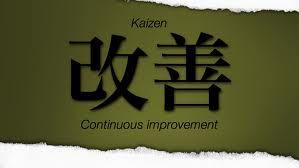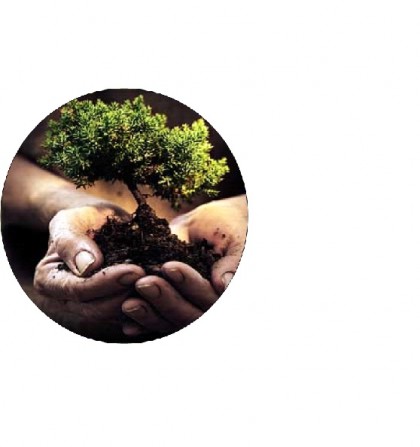Sustainability Through Kaizen: Step Seven of Having a Life You Love
By Dr. Jeff Rockwell
Anybody can succeed, at least once in a while. But consistent and lasting success in life comes only from a commitment to daily improvement; by being open to and not frightened away, by change; by striving to become a little bit wiser each day. Success means many things to different people but I propose that it is the constant increase in the quality of every aspect of our life – our health, our wealth, our knowledge, and our relationships— including one’s relationship with one ’s self. I am not talking about huge improvements. What I am talking about are very small incremental daily improvements that add up to a Big Life Worth Loving (BLWL).
How do we get ourselves to consistently act in a way that causes us to increase the quality of our life and our enjoyment of it? It is by committing to the philosophy of Kaizen.
 But what on earth is Kaizen? Kaizen is a Japanese term that literally stands for “Constant and Never-ending Improvement.” The term, made popular by the Toyota Company during the days of its breakthrough into the American auto market, loosely translates to “change for the better” and is a slow-and-steady method of encouraging success in workplaces. In those who follow Kaizen, people at all levels of an organization—from the cleaning crew to the company president—use key fundamentals to make productive changes, improve attitudes and increase overall achievement. But the principles behind this practice can also be applied to our everyday life—our interactions with those around us, the attainment of personal goals and our quest to find balance and contentment in daily life. “This technique helps the brain learn habits through small, daily steps we take to improve our health, our relationships and our work efforts,” writes business author Robert Maurer, Ph.D. The way our life gets better is not by occasionally jumping into it with wild enthusiasm. The quality of our life gets better by making a habit of consistently and consciously improving in each and every area of our lives—every day (or very close to it). That is, admittedly, a tall order but really takes not much more effort than “living-by-default” and allowing a miserable life to happen to us. In the words of the late motivational author, Zig Ziglar, “Inch by inch, anything’s a cinch. Mile by mile, everything’s a trial.” Committing to these tiny improvements which, while they may seem like nothing in the moment, will build upon each other until, one day, we discover we are “playing life” at a whole different level of embodiment and expression.
But what on earth is Kaizen? Kaizen is a Japanese term that literally stands for “Constant and Never-ending Improvement.” The term, made popular by the Toyota Company during the days of its breakthrough into the American auto market, loosely translates to “change for the better” and is a slow-and-steady method of encouraging success in workplaces. In those who follow Kaizen, people at all levels of an organization—from the cleaning crew to the company president—use key fundamentals to make productive changes, improve attitudes and increase overall achievement. But the principles behind this practice can also be applied to our everyday life—our interactions with those around us, the attainment of personal goals and our quest to find balance and contentment in daily life. “This technique helps the brain learn habits through small, daily steps we take to improve our health, our relationships and our work efforts,” writes business author Robert Maurer, Ph.D. The way our life gets better is not by occasionally jumping into it with wild enthusiasm. The quality of our life gets better by making a habit of consistently and consciously improving in each and every area of our lives—every day (or very close to it). That is, admittedly, a tall order but really takes not much more effort than “living-by-default” and allowing a miserable life to happen to us. In the words of the late motivational author, Zig Ziglar, “Inch by inch, anything’s a cinch. Mile by mile, everything’s a trial.” Committing to these tiny improvements which, while they may seem like nothing in the moment, will build upon each other until, one day, we discover we are “playing life” at a whole different level of embodiment and expression.
Kaizen implies living by habit. In truth, we all do this all the time, but to what kind of habits are we loyal? Successful people develop the habit of doing the things unsuccessful people don’t like to do. That is a fairly simple, yet profound, formula for success. Who likes to get up an hour earlier to exercise, review goals, meditate or make breakfast for their partners? Not too many people, to be exact. But successful people make small things like these a habit, ones that create energy, enthusiasm, and positive momentum.
Nothing in life feels as fulfilling and juicy as knowing we are living life by our own code of excellence, or sharing the gifts and talents that lie within us. We feel frustrated when we don’t feel we are growing or fulfilling our potential, and this growth comes from the accumulation of many, seemingly insignificant, successful days.
Most people don’t succeed in achieving their goals because they don’t believe they can achieve them. If you set very high standards and set equally large goals, your brain may rebel since it feels pressured by the possibility of failure. The power of Kaizen, however, is that it is believable.
Here are three questions that we can ask ourselves at the end of each day. These questions help us to stay on purpose and true to our commitment to Kaizen. They are:
1. What did I learn today?
2. How has today added to the quality of my life?
3. What am I grateful for this evening?
The overriding principle of kaizen is that it is daily, continuous, steady, and it takes a long-term view. Kaizen also requires a commitment and a strong willingness to change. As Lao Tzu said, “Each journey begins with a single step.” Or as I like to put it, KMFA! Keep moving forward always!Published: October 16, 2013
There is an old saying that goes “Once you think you have arrived, you have already started your descent.” One must never think they “have arrived.” This is a paradox: In one sense, we have–spiritually speaking– always arrived, in that we “are where we are,” and there is great contentment to be found in accepting that. As the Buddha said to his students when asked the secret of happiness, “Happy having, happy not having.” But there is another way of looking at this. In the West we say “If it ain’t broke, don’t fix it.” The spirit of kaizen, on the other hand, suggests that there is always something to learn and ways to improve, and that it is also better to prevent problems than to fix them. Thus, no matter how good things may seem now, there is always room for improvement, and looking to improve every day is what the spirit of personal kaizen is all about. It’s not about how far you have come or how far you have yet to go, it is only about this moment and being open to seeing the possibilities and lessons around you.

The seventh core belief of National Holistic Institute is “Sustainability Through Kaizen. Sustainability is a close cousin to success, especially when applied to the success or health of our beloved planet. April 22nd is Earth Day, a perfect time to take personal inventory of our relationship (and our community’s) to the planet. Thoreau wrote, “What is the use of a fine house if you haven’t got a tolerable planet to put it on?” This wasn’t—and isn’t—a rhetorical question. What is the point of a successful life if we do not have a tolerable planet on which to live? Any answer we can think of seems too challenging. Remember, however, we are not alone. While there is no single solution to our ecological problems, there are 7 billion solutions. Each of us has been given a piece of this sacred planet to save. And how should we go about accomplishing such a mighty task? One step at a time, every day, in the spirit of Kaizen.
Visit – http://www.earthday.org/ and find out how you can volunteer in your area!